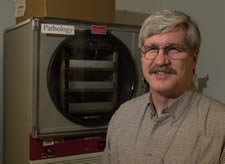Agreement puts freeze-dried platelets closer to clinical trials
Hemocellular Therapeutics, expected to produce the first platelet-based therapeutic blood product available to doctors for the immediate treatment of bleeding, has established an exclusive licensing agreement with East Carolina University and the University of North Carolina at Chapel Hill, company officials announced.
The agreement recognizes key technology developed by researchers at the two universities as central to the N.C. company’s planned creation of lyophilized, or “freeze-dried,” human platelets — the component of blood primarily responsible for starting coagulation. As part of the agreement, both universities received equity in Hemocellular and will share in royalties on the eventual sale of the products.

Dr. Arthur Bode of the Brody School of Medicine is half of a duo working to develop freeze-dried platelets to help stop bleeding in humans. Photo by Cliff Hollis
Hemocellular’s freeze-dried platelets are the result of a decade of research supported by initial federal funding of $10 million.
The company’s scientific founders, Dr. Arthur P. Bode of ECU and Dr. Thomas H. Fischer of UNC, have led the research efforts. Bode, professor of pathology and laboratory medicine, has served as ECU’s scientific director of clinical coagulation programs for 15 years. Fischer is scientific director of UNC’s Francis Owen Research Laboratory, where researchers discovered the molecular cell membrane cross-linking technology crucial to Hemocellular’s product development, said Richard A. Basile, chief executive officer of the company.
Basile added that the licensing agreement is key in advancing platelet development to the next stage: human clinical trials. No other functional hemostatic agent is known to be in this stage of development, he said, and the need for such an agent to be developed is critical, particularly in acute-care settings. Human trials could start as early as 18 months, he said.
“The freeze-dried platelets work very much like fresh platelets in your body,” Bode said, “especially in regard to sticking to wound sites to stop active bleeding. They also retain some of the responsiveness of fresh platelets to appropriate stimuli and regulation. In essence, they are primed to plug sites of bleeding without causing clots in the wrong places.”
The U.S. Centers for Disease Control and Prevention reported active bleeding was the primary or secondary diagnosis of more than 4 million admissions to non-federal hospitals nationwide in 1999. In addition, tens of thousands of deaths are estimated to occur nationwide each year due to issues related to bleeding.
“We see tremendous implications for this technology,” Basile said. “Our primary focus, ultimately, is to bring doctors and other health-care professionals a new tool in dealing with the very serious medical challenges associated with clinical bleeding. We also see this as a means to strengthen our nation’s biodefense efforts.”
The current standard of care, liquid-stored platelets, does not provide immediate responsiveness after reinfusion, is vulnerable to viral and bacterial infection, and can be stored for only five days.
The technology licensed to Hemocellular modifies human platelets to be a hemostatic agent with a shelf life as long as five years, to be safe and sterile, and to provide immediate response to platelet-related bleeding.
The benefits of freeze-dried platelets would aid not only hospital patients but also the military – whether it’s a ship at sea or on the front-lines.
“What we will offer clinical medicine is a first-ever safe and sterile cellular product, made to pharmaceutical standards, that can provide immediate clotting for the patient through transfusions,” Bode said.
Hemocellular is evaluating use of facilities at the Technology Enterprise Center of Eastern Carolina in Greenville to produce the product for clinical trial testing, said Marti Van Scott, director of technology transfer at ECU.